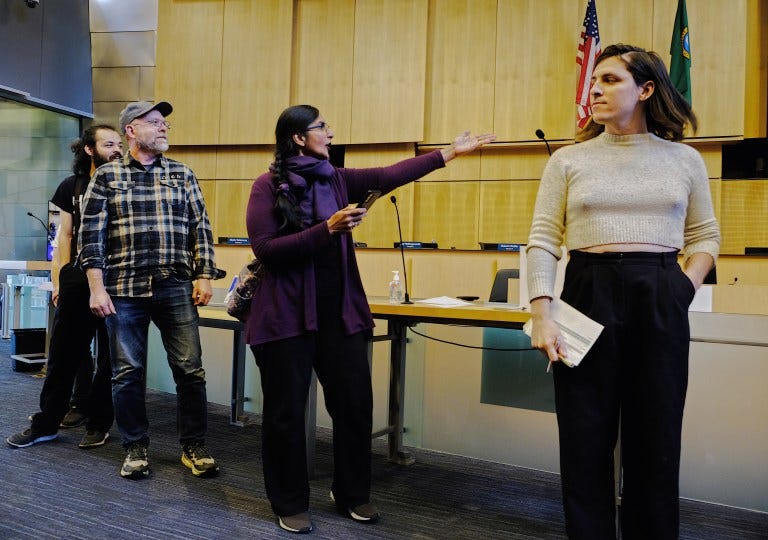Council Faces Constituents Opposed to Weakening Ethics Rules
Proponents have argued that recusing themselves will deprive residents of representation. But the only ones clamoring for the chances are council members themselves.

By Erica C. Barnett
Over the past few weeks, the Seattle City Council has fast-tracked legislation that would allow them to vote on legislation that presents a financial conflict of interest. Currently all city employees are required to recuse themselves from matters in which they have financial conflicts; the bill, sponsored by Cathy Moore, would remove the recusal requirement and revert to rules, which currently apply only to tax proposals, requiring council members to merely disclose their conflicts one time before voting.
The council is proposing the changes shortly before they're expected to vote to eliminate winter and school-year eviction moratoriums, roll back rules allowing tenants to add roommates, and increase the maximum late fee for unpaid rent, which is currently $10. Two council members, Mark Solomon and Maritza Rivera, are landlords who might have to recuse themselves from voting under the current rules.
Moore and other council members who support the change have argued, dubiously, that abstaining from such votes would deprives their constituents of representation. Maritza Rivera, who represents Northeast Seattle's District 4, said was "compelled" by the argument that her constituents would be disenfranchised if she couldn't vote despite a financial conflict. "We were put here to represent our constituents, and if they want something, then we're not able to advocate for that what they would want," she said.
Last Thursday, many of those constituents showed up to a meeting of the council's governance committee to voice their opposition to Moore's proposal, saying they expect council members to avoid conflicts of interest, not embrace them.
Rachel Snell, who also testified at a meeting of the city's Ethics and Elections Commission on Wednesday, pointed out that not one person has testified in favor of rolling back the ethics code. "Why would elected officials who were voted into office by the people even consider a piece of legislation that is strongly opposed by the people?" Snell said. "I said this Tuesday, and I'm going to say it again: You are not entitled to demand our trust and support. You have to earn our respect and trust."
Even former city council member Kshama Sawant, who sponsored the anti-eviction rules the council is preparing to repeal, got into the action. She and a small group of supporters chanted and yelled until committee chair Sara Nelson pulled the meeting into recess; at that point, the group came up to deliver an impromptu lecture on renters rights and encourage people to join Sawant's group Workers Strike Back to a mostly empty room.
Councilmember Dan Strauss, sitting in on the committee, cross-examined Wayne Barnett, the director of the city's Ethics and Elections Commission, about Council President Sara Nelson's vocal opposition to Barnett's recommendation that former councilmember Tanya Woo recuse herself from a vote on delivery workers' wages because she owns a restaurant.
The interrogation—seemingly structured to suggest that Nelson put pressure on Barnett to support changing the ethics law—led to some sniping between Nelson and Strauss, who suggested that a compromise might be to delay the effective date of the changes until after the 2027 elections, when the seven district councilmembers will have an opportunity to run under the new ethics rules.
Barnett, who enforces the city's ethics code, said he wasn't taking any position on the proposal. However, he added that "there are times where I feel like everyone should just know" what people's conflicts are—"like, put out in public what your interests are, then you can either recuse yourself ... or go forward, and you're going to be held accountable for that decision you make by your voters."
Barnett, who worked at the Massachusetts State Ethics Commission for several years before starting his current job in 2004, said he became accustomed to "big-city politics" in places like New York and Boston, where city council members just have to disclose their conflicts. As an astute PubliCola reader pointed out, Boston's city council isn't exactly a paragon of ethical behavior these days.




